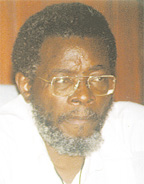Government’s band-aid approach over the years to complaints from Guyanese travelling to Barbados and inadequate representation on the island have contributed to the current tenuous situation, the PNCR said yesterday, calling for action now to develop a sensible long-term policy on the issue.

But government believes the lack of clarity of many aspects of the free movement of Caricom nationals around the region may be a contributory factor to the situation facing not only Guyanese, but other Caricom nationals, its spokesperson Dr Roger Luncheon said.
These comments come in the wake of the decision by the Barbadian government to clamp down on undocumented immigrants, who have been given until June 1, to submit themselves to immigration and meet certain requirements, or be removed from the island by year end. In response to a question from this newspaper, at his weekly post-Cabinet press briefing, Luncheon said new arrangements needed to be put in place that correspond to the reality of nationals moving across the region. However, he said he did not believe that a resolution could be advanced solely on the basis of public scrutiny and public commentary, as the specifics of each situation would need to be addressed.
In a statement read at its weekly press briefing yesterday, the PNCR criticized the government’s lack of pro-activity in defending Guyanese in Barbados.
The party said over the years, as Guyanese complained of harassment and discrimination, government merely adopted “band-aid” measures when what was needed was a firm and well-thought-out policy.
“The only thing that Guyanese were told was that the matter was being raised at different levels or might have engaged Heads of Government but nothing about a proposed solution,” the statement read.
It said the result is that the Thompson administration in Bridgetown has taken official action which would most likely have unpleasant implications for Guyanese who have lived there for a long time and also for the implementation of the Caricom Single Market and Economy.
However, the party said it did not believe it was now too late for government and Caricom to put together a team of experienced past and serving Caribbean diplomats who could embark on a fact-finding mission to Barbados and report to the Caricom Secretary-General on the current situation affecting all Caribbean nationals.
The party said this step is necessary since it is convinced that the representation afforded by the consulate in that island has been far from adequate.
Although Barbados Prime Minister David Thompson, in his address to Parliament, clearly stated that the new policy was to deal with the problem of illegal immigration and that only “undocumented Caricom nationals who entered Barbados prior to December 31, 2005 and remained undocumented for a period of eight years or more” would be affected, Guyanese living and working on the island legally have said that processing of work permits have been delayed and some of them fear that they would be targeted.
According to Luncheon, the trials and tribulations of Caricom nationals who for various reasons are not resident in their home countries have been around as long as the revised Treaty of Chaguaramas or probably before.
He pointed out that Caricom Heads of Government have made the effort through the mechanism of freedom of travel to provide some control of the movement of nationals within Caricom and consequently the treatment. He said this was a perspective that one should pay attention to, and noted that the stated focus of the Barbadian authorities has been undocumented non- nationals.
He said the records would show that government has taken a principled position on the issue and so have other Caricom heads. “I don’t believe that a resolution would be advanced solely on the basis of public scrutiny or commentary.
Each situation would have to be looked at and this is where we rely on the Ministry of Foreign Affairs and its consular offices in Caricom countries to articulate the Government of Guyana position and to defend the interest of Guyanese who are affected.”
The Guyana Foreign Ministry has so far been silent on the issue.
Luncheon said government would certainly be operating at the level of the Heads and the appropriate institutions of Caricom to continue to articulate the Guyanese cause in concert with other Heads of Government whose nationals are similarly exposed and affected.
He said a Heads of Governments meeting could perhaps reduce the lack of clarity by introducing additional practices that over time would build a more healthy and realistic approach to the problem of the undocumented.
He pointed too to contingent rights, stating that while a person may have freedom of travel the question of the right of that person’s immediate family would arise.
“So we are going to go out there and continue as we have been doing, fighting and articulating,” Luncheon said adding “and this is a reactionary approach to the [decisions] being made by authorities in these countries that offend us, that we feel may not be carried out in the context of the legislation and norms and at the same time go ahead drafting new arrangements; putting in place the understanding that more correspond to the reality of nationals moving, their families moving and yes may very well be identified as undocumented.”





